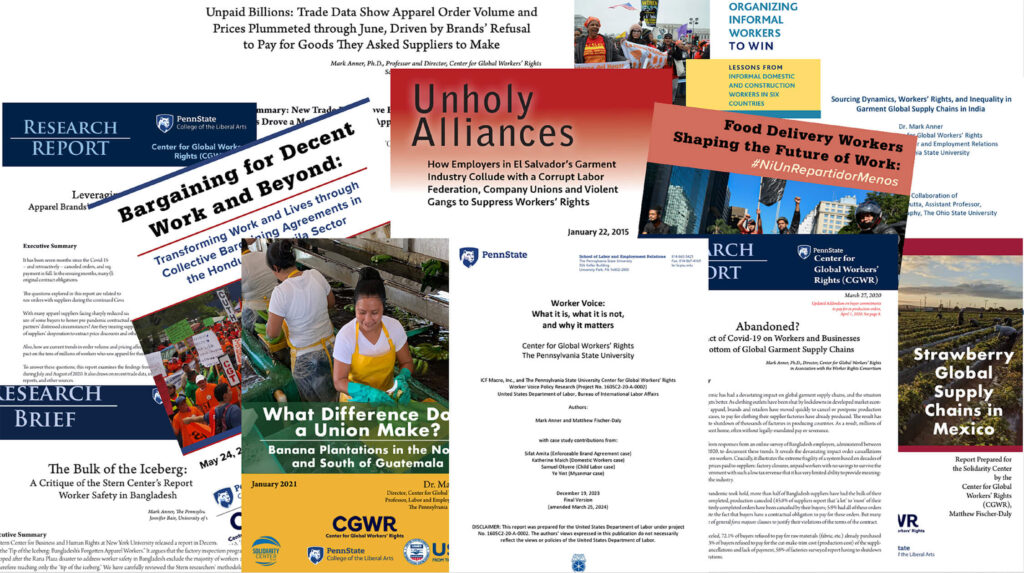
“Latin American Labor at a Crossroads: Obstacles and Opportunities in Times of Change”
April 13-14, 2023
Center for Global Workers’ Rights
Dr. Mark Anner Center Director, Center for Global Workers’ Rights
EMAIL: cgwr@psu.edu PHONE: +1 814-865-5425 FAX: +1 814-867-4169The Center for Global Workers’ Rights hosted its Tenth Spring Symposium “Reflecting on Struggles for Decent Work in Africa: Challenges, Opportunities and Outcomes” on April 3 and 4 to address critical topics such as long-term structural challenges like governance and democratization, endemic working poverty, informal employment, and population displacement in Africa. The Public Seminar “Challenges and Opportunities for Workers in Africa” took place as part of the CGWR Symposium activities in State College the night of April 3 at the Foster Auditorium, 102 Paterno Library.
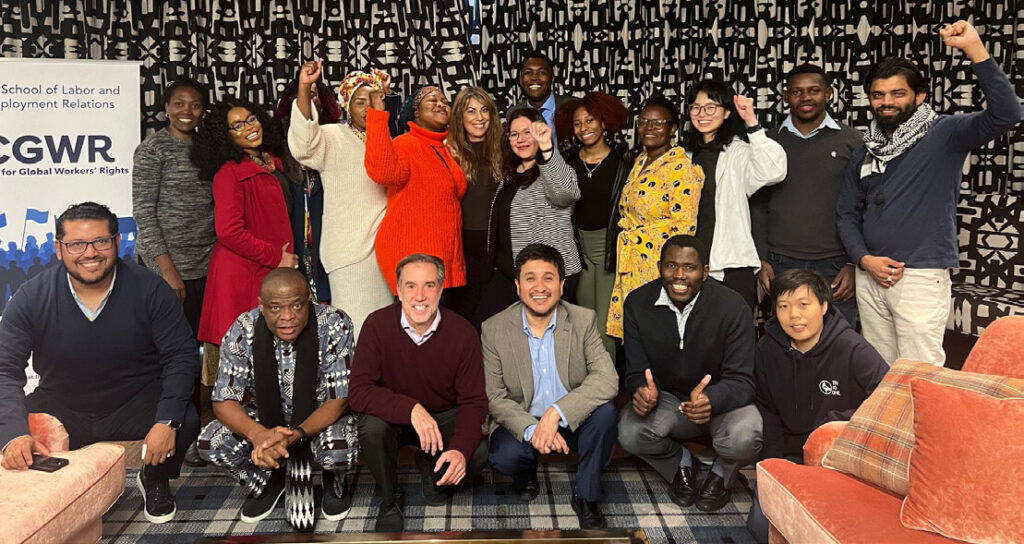
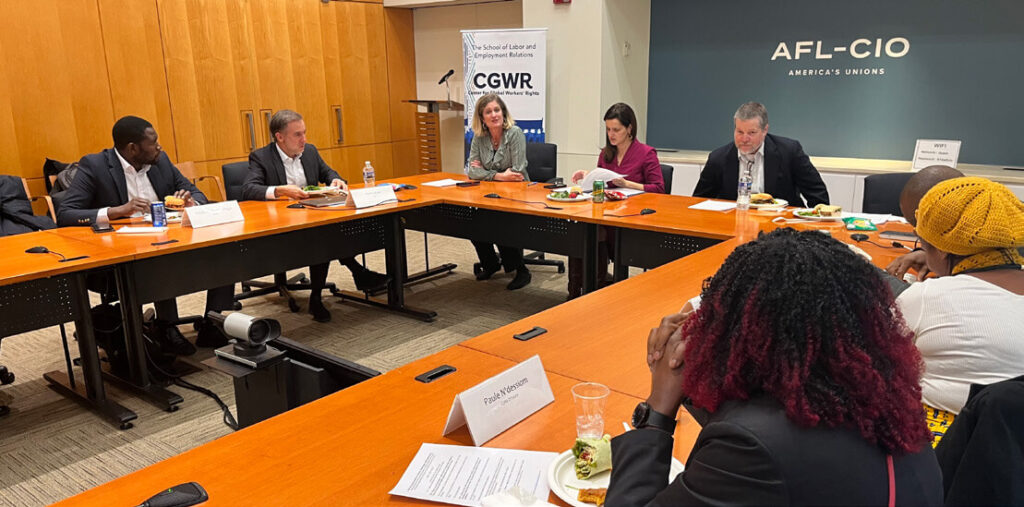
These academic-practitioner events brought together top scholars, unionists, and worker rights advocates from five different African countries (Kenya, Ghana, Nigeria, Uganda, and South Africa) and the United States to analyze the potential and challenges for the African labor movement. The symposium was held with in-person and virtual participants and was cosponsored by the African Studies program.
The event also included the participation of Javier Salinas García from the Labor Center of the Autonomous University of Querétaro (Mexico); Clemente Abrokwaa, Penn State’s Director of African Studies program; Penn State professors Arthur Matthews, Mary Bellman, Kate Ragon; and other faculty and staff affiliated to the CGWR. The symposium booklet and speakers’ notes are available here.
As part of the CGWR Symposium, the Public Meeting “Achieving Decent Work in Africa: Challenges and Opportunities,” a dialogue between trade unionists, experts, and representatives of U.S.-based international organizations in charge of promoting decent work in Africa took place on April 5 at the AFL-CIO headquarters in Washington, D.C.
Union leaders that were invited to the Public Meeting had the opportunity to share their thoughts about U.S. Global labor strategy in Africa with Kelly Fay Rodriguez, Special Representative for International Labor Affairs; Cathy Feingold, Director of the International Department at AFL-CIO; and Crispin Rigby, International Relations Officer at ILAB/US Department of Labor.
This summer, the CGWR’s founding director, Mark Anner, will leave Penn State to join Rutgers University as its Dean of the School of Management and Labor Relations (SMLR). For Mark, the change will be bittersweet. In 2011, with start-up funds provided by Penn State’s School of Labor and Employment Relations, Mark began what then was a small “Project for Global Workers’ Rights”.
By 2024, the “project” had become the internationally-recognized Center for Global Workers’ Rights. Over the past thirteen years, CGWR has published seventeen reports (see pages seven–eight for complete list), with several of these reports having significant impact on policy. One of Mark’s reports was referenced in a Vice-Presidential briefing, another was included in the White House newsletter, and a third established the U.S. Department of Labor’s definition of “worker voice.” Funding for this research was provided by more than $1.5 million in grants and awards from the Ford Foundation, the Open Society Foundations, the International Labour Organization, the Solidarity Center, and the U.S. Department of Labor.
The CGWR has also hosted ten international symposia, including the recent one on workers’ rights in Africa (see article above). The Center’s Labour Rights Indicators—a database on workers’ rights around the world—became the foundation for how the United Nations measures progress on workers’ rights for its Sustainable Development Goal 8.8.2. Over the course its thirteen-year history, the Center also funded ten postdoctoral fellows and hosted ten visiting scholars from Australia, Bangladesh, Brazil, China, Germany, India, Italy, Mexico, South Korea, Spain, and the United States (See page nine for the complete list). CGWR has supported student research and advocacy, most notably for workers’ rights in the global garment industry, and summer internships for Labor and Global Workers’ Rights MPS students. It has funded research conducted by junior scholars, including Katherine Maich’s work on the platform economy in Mexico, Rebecca Tarlau’s work on U.S. teacher organizing, and research by Elaine Hui on Labor Strategies of Chinese Companies in the United States. Furthermore, CGWR sponsored and cosponsored dozens of speakers, films, and other events at Penn State and beyond. Stewardship of CGWR will continue in the very capable hands of Luis Mendoza.
Established in 2014, the master’s in professional studies degree in Labor and Global Workers’ Rights (LGWR) is tailor-made for labor activists and researchers that are passionate about and committed to promoting global workers’ rights and strengthening the global labor movement. It is one of the few labor programs in the United States that has a strong global focus, especially on Asia, Latin America, and North Americas. Emphasizing both theoretical and practical knowledge, the program has given attention to formal and informal work, gender and migration, the global supply chain, strategic corporate research, international labor standards, and more.
Small class sizes and close interactions between students and professors are key features of the program. In the last ten years, the program has admitted more than sixty students from five continents, more than half of whom are women or non-binary. Most of the program’s graduates continue to devote themselves to the labor movement after they graduate, serving as staff for unions and worker centers, labor researchers, and in other related positions.
Having built a solid network among labor activist alumni that are spread across many countries, the LGWR program is more than an academic program—it is part of the Global Labour University (GLU), which is “rooted in the partnership of trade unions, universities, the International Labour Organization (ILO) and labour support organisations across the world.” Through the LGWR program and GLU, our students and alumni obtain both intellectual and practical movement resources and become part of the mobilizing structure that are critical for strengthening the global labor movements.
Not content to merely study workers’ rights from the sidelines, LGWR students actively organize to build student and worker power in our community.
In recent years, LGWR students have organized several marches in State College and Bellefonte, urging legislators to raise Pennsylvania’s minimum wage, which has languished at $7.25 for fifteen years. Students also advocated for a minimum wage of at least $15 for all campus workers and commissioned a plane to soar over a Penn State Football game displaying a banner proclaiming “raise the wage” alongside a number to text to join the movement. They’ve also displayed solidarity by joining picket lines in cities from State College to Lancaster, standing shoulder-to-shoulder with striking workers.
Currently, LGWR students are helping lead a campaign to hold Nike accountable for wage theft and other workers’ rights violations in international factories that create Penn State apparel. LGWR students have also taken on leadership roles in efforts to create a labor union for graduate student workers, and engaged in campaigns for racial justice, tenants’ rights, COVID relief, and a ceasefire in Gaza. LGWR-student Haoju Lu of China says that such campaigns have complemented her academic studies by giving her insight into “the logics and dynamics of activism in a context where workers have freedom of association and have a so-called democratic political structure.” She shared that “Now, I neither feel overly pessimistic about the struggle within authoritarian regimes nor overly optimistic about the struggle within democratic societies.”
As part of its mission to promote awareness and action around workers’ rights, CGWR orchestrates public programming to educate students, faculty, and community members on the importance of the global labor movement. One of CGWR’s flagship initiatives is its speaker series, which invites cutting edge practitioners and scholars to share insights from the frontlines of the labor movement. Recent speakers have included leaders from the Amazon Labor Union, the Colombian Association of Recyclers, and the American Federation of Teachers. CGWR’s annual symposium serves as a platform for robust discussions on workers’ movements around the world. Public panels have delved into topics ranging from democracy and labor in Latin America to struggles for decent work in Africa.
In 2019, CGWR launched the “Landscapes of Labor” film series in collaboration with the Sustainability Institute. The series highlights the interconnectedness of struggles for workers’ rights, environmental sustainability, racial justice, and gender equity. To date, CGWR has organized 14 film screenings, attracting 1,755 attendees. These screenings featured post-film discussions led by twenty different speakers, including global labor leaders, Oscar-winning filmmakers, and scholars from the United States, Brazil, China, South Korea, and Peru. Our 2023–2024 events included an open-air screening of The Grapes of Wrath and a series of short films about waste, work, and dignity. Such engagements allow attendees to gain firsthand knowledge and engage in meaningful dialogue around contemporary labor issues.
In July, the Center for Global Workers’ Rights released “Organizing for Life: Workers’ Rights in the Palm Oil Sector of Honduras.” Authored by assistant research professor Matthew Fischer-Daly with research assistance from Labor and Global Workers’ Rights master’s degree student Alejandra Flores Mejía, the report is the product of CGWR research grant from the Solidarity Center. As the report details, the Honduran government invested in creating a palm oil sector to address land and labor conflicts while increasing national economic growth, and subsequently facilitated the sector’s restructuring into an oligopoly. The companies Dinant and Grupo Jaremar dominate the sector, and protracted land and labor disputes are determining its future. Honduran palm oil workers endure physically dangerous work and gender-based violence while earning low wages. These poor terms and conditions are driving workers into debt, to forego medical care, and to migrate. To improve conditions in the sector, workers are unionizing and seeking to collectively bargain. At one oil palm farm, workers raised wages, reduced hours, and began addressing health and safety and gender-based discrimination by unionizing, even before negotiating a first collective contract. However, with four clauses left to negotiate, the workers’ jobs were effectively outsourced. At other farms and palm oil processing mills, workers waited more than a year for the government to register their unions. The research indicates that continued organizing toward increased union density, establishing sectoral bargaining, and strengthening labor law enforcement holds promise for improving livelihoods in the Honduran palm oil sector.
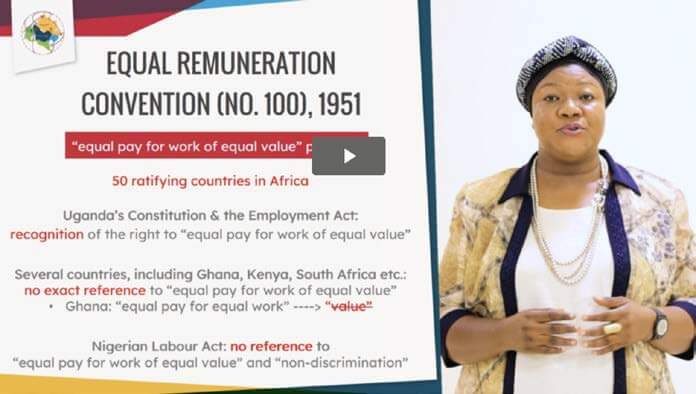
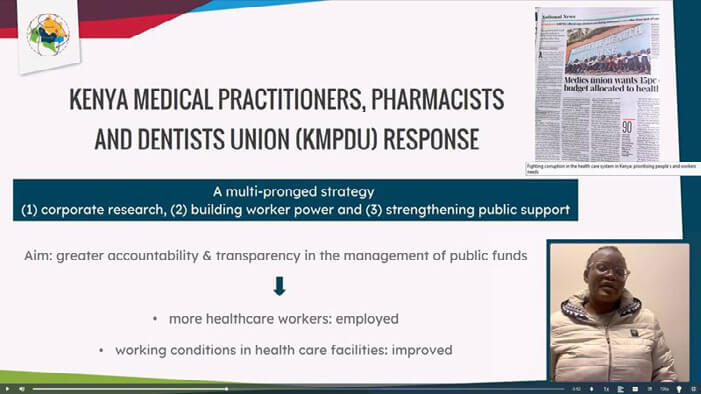
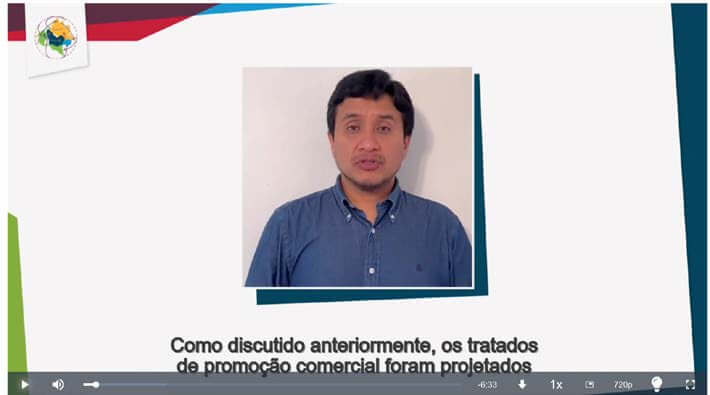
The LGWR program is the fifth graduate program of the Global Labour University (GLU) at Penn State. The LGWR program is unique because it gives students academic and professional skills. Its faculty has extensive experience in labor-related research and the global labor movement as a whole. Alumni from the program actively participate to achieve the objectives of the GLU network and strengthen the GLU Online Academy (GLU-OA), a pioneer in online labor education reaching thousands of trade unionists and labor activists in almost every country around the world. GLU-OA offers more than 25 Massive Open Online Courses (MOOCs) and has nearly 150 trainers in about 45 countries.
Four of the LGWR alumni are currently tutors at the GLU-OA. Bashiratu Kamal (Cohort Five or Class 2019) lectures on Subordination and Discrimination in Global Supply Chains. Luis Mendoza (Cohort Six or Class 2020), has a video lecture on Desafiando el Poder Corporativo en America Latina, an online course available in Spanish, and current student Mercy Nabwire (Cohort 10 or Class 2024) conducts an online video lecture titled The Future is Public.
Another alumnus, Margaret Marfo, who graduated from the LGWR program in 2021, is part of the Certified Global Team of Trainers and Tutors (GTTT) of the GLU-OA. Marfo is also the Coordinator of the English-Speaking Africa group of GTTT. She trains trade unionists, labor activists, and human resources practitioners on the GLU MOOC. To ensure labor compliance, decent jobs, healthy workspace, and proper workplace practice, she establishes study circles to facilitate learning and experience sharing using the Spiral Learning Model.
Over the course of its thirteen-year history, CGWR reports have developed a form of participatory research known as “Worker-Driven Co-Research in Global Supply Chains.” Worker-driven research is an approach by which workers do not simply participate in the gathering of data for someone else’s project, but rather are fully involved in establishing research questions and are engaged in the analysis and the dissemination of findings. It is an alternative to extractive research in which researchers take information from the researched without giving back to the subjects of the investigation. The inclusion of global supply chains in this research approach means workers are engaged not only in gathering information about their workplaces and communities but are also researching operations across countries and the global corporate headquarters, ideally in an effort to design comprehensive campaigns and bargain more effectively with their employers. “Worker-driven” is not meant to suggest an alternative to efforts led by a trade union. Rather, this research method is meant to be an inclusive term that covers the research engagement of unionized workers and workers who are not unionized. The “co” in co-research are the academically-trained researchers who bring formal research skills to the investigative effort. For example, while unionists and workers might take the lead in surveying workers and mapping out local production, academically-trained researchers would lead on analyzing the global financial situation of a corporation or mapping a global industry. This approach was used in researching banana workers in Guatemala, garment workers in Honduras, auto parts workers in Mexico, and, most recently, palm oil workers in Honduras. For more details on the approach, see Mark Anner (2024), “Worker-Driven Co-Research in Global Supply Chains: Three Studies from Latin America.” New Labor Forum.
LGWR students participated in the 2024 Labor Notes Conference in Chicago from April 19–21. The conference provided a wonderful opportunity to learn about a powerful chapter in the U.S. labor movement and progressive labor activism from Africa, Asia, Latin America, and other countries in the Global South. At the conference, students connected with organizers, activists, and socialists from all over the world, and learned with each other, attempting to build international solidarity.
LGWR students organized a panel called “Labor in the Global South” to share about inspiring struggles that happened in recent years in their own countries. The panel was packed with attendees who engaged in lively and deep discussions. Mercy Nabwire, an LGWR student and a member of the Kenya Medical Practitioners, Pharmacists, and Dentists Union, was the speaker in a featured panel called “The Health Care System We Need and the Labor Movement that Can Win It” and a panel called “Solidarity: Stories from Unions Across the World.”
LGWR students also actively participated in a spontaneous protest in support of Palestine, where hundreds of people gathered outside the conference site at the Hyatt Regency O’Hare, Chicago. Muzammal Afzal, an LGWR student, played a leadership role in the protest.
The Global Labour University’s (GLU) twenty years celebration took place on April 30 at the Friedrich-Ebert-Stiftung Foundation in Berlin. CGWR Director Mark Anner participated in two roundtables. He presented on “Experiences and challenges of the GLU” from the perspective of the LGWR Program, and “Global supply chain and due diligence: making use of German and international regulations.”
The master’s in professional studies degree in Labor and Global Workers’ Rights has been part of the GLU network since 2014 and this was a great opportunity to share experiences with representatives of the other campuses affiliated to GLU: The University of Campinas, Brazil; Jawaharlal Nehru University, India; University of the Witwatersrand, South Africa; Kassel University/Berlin School of Economics and Law, Germany; and the University of the Philippines.
In June, the Center for Global Workers’ Rights released “Worker Voice: What it is, What it is Not, and Why it Matters: Summary Report.” CGWR director Mark Anner and assistant research professor Matthew Fischer-Daly co-authored the report with case study contributions by Penn State assistant professor of labor and employment relations, and women’s, gender, and sexuality studies, Kate Maich; Labor and Global Workers’ Rights alumni, Sifat Amita and Ye Yint; and University of Bristol senior lecturer in sociology, Samuel Okyere. The report summarizes findings from a year-long research project by CGWR, funded by the U. S. Department of Labor Bureau of International Labor Affairs, detailed in this longer report and on USDOL-ILAB’s website. The research responds to frequent and confusing uses of “worker voice” that serve to impede its exercise. Through an exhaustive literature review, roundtable discussions, interviews, and seven case studies, the report finds that worker voice entails the capacity of workers to speak up, articulate, and manifest collective agency to improve the terms and conditions of work and livelihoods and to contribute to more equitable and democratic societies. The evidence presented in the report highlights that the most effective forms of worker voice are institutions and mechanisms that enhance workers’ ability to elect, represent, protect, include, enable, and empower workers and their organizations. The summary report presents this definition of worker voice, a framework for analyzing mechanisms’ effects on worker voice, case studies, and key takeaways for researchers, policymakers, and practitioners.
CGWR co-sponsored the talk “Standing Up and Speaking Out as an Act of Intellectual Resistance: Educators Fighting the Restrictions on Teaching and Academic Freedom” organized by the Consortium for Social Movements and Education Research and Practice (CSMERP).
The distinguished speaker was Karla Hernández-Mats, the president of the United Teachers of Dade (UTD), who discussed how educators are fighting restrictions on teaching and academic freedom. Karla was born and raised in Miami. She is a first-generation American of Honduran descent and the first Latina officer to be elected to the UTD.
Karla emphasized that intellectual resistance is vital for defending democratic principles, upholding human rights, and fostering a culture of truth, justice, and progress. The event took place on April 25 at the Memorial Lounge in the Pasquerilla Spiritual Center.
